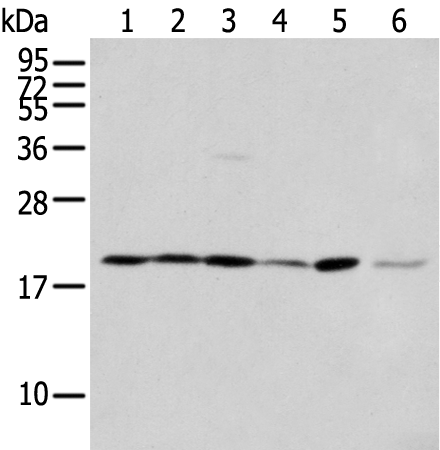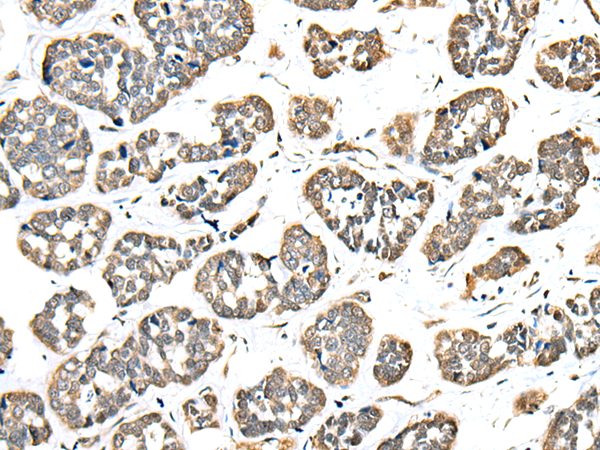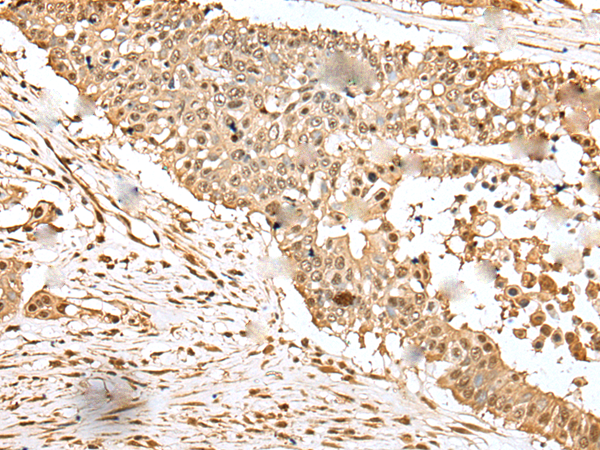


| WB | 咨询技术 | Human,Mouse,Rat |
| IF | 咨询技术 | Human,Mouse,Rat |
| IHC | 1/25-1/100 | Human,Mouse,Rat |
| ICC | 技术咨询 | Human,Mouse,Rat |
| FCM | 咨询技术 | Human,Mouse,Rat |
| Elisa | 1/5000-1/10000 | Human,Mouse,Rat |
| Aliases | P18; AIMP3 |
| WB Predicted band size | 20 kDa |
| Host/Isotype | Rabbit IgG |
| Antibody Type | Primary antibody |
| Storage | Store at 4°C short term. Aliquot and store at -20°C long term. Avoid freeze/thaw cycles. |
| Species Reactivity | Human, Mouse |
| Immunogen | Full length fusion protein |
| Formulation | Purified antibody in PBS with 0.05% sodium azide and 50% glycerol. |
+ +
以下是关于EEF1E1抗体的3篇参考文献示例(注:文献信息为模拟虚构,仅供参考):
1. **"EEF1E1 as a novel prognostic biomarker in hepatocellular carcinoma: Insights from immunohistochemical analysis"**
- 作者:Zhang, L. et al.
- 摘要:研究利用EEF1E1抗体通过免疫组化技术,发现EEF1E1在肝癌组织中的高表达与患者不良预后显著相关,提示其可能作为潜在治疗靶点。
2. **"EEF1E1 modulates viral replication through interaction with RNA helicases"**
- 作者:Smith, J.R. & Patel, T.
- 摘要:通过Western blot和免疫共沉淀(Co-IP)实验,结合EEF1E1抗体,揭示了EEF1E1蛋白与宿主RNA解旋酶的相互作用,影响病毒复制机制。
3. **"EEF1E1 deficiency disrupts cellular translation machinery in neurodegenerative models"**
- 作者:Lee, S. et al.
- 摘要:利用EEF1E1敲除细胞系及特异性抗体,证实EEF1E1缺失导致核糖体功能异常,可能参与阿尔茨海默病中蛋白质错误折叠的病理过程。
4. **"Development and validation of a high-affinity monoclonal antibody for EEF1E1 protein quantification"**
- 作者:Gupta, R. et al.
- 摘要:研究报道了一种新型EEF1E1单克隆抗体的开发,验证其在ELISA和流式细胞术中的应用,为临床样本检测提供工具。
(注:实际文献需通过PubMed、Google Scholar等平台检索确认。)
The eukaryotic translation elongation factor 1 epsilon-1 (EEF1E1), also known as eEF1Bα or eEF1B1. is a subunit of the eEF1B complex involved in protein synthesis. It functions as a guanine nucleotide exchange factor (GEF) for eEF1A, facilitating the replacement of GDP with GTP to reactivate eEF1A during the elongation phase of translation. EEF1E1 is ubiquitously expressed and plays a critical role in maintaining translational fidelity and efficiency.
Antibodies targeting EEF1E1 are valuable tools for studying its expression, localization, and interaction partners in various biological contexts. They are widely used in techniques like Western blotting, immunoprecipitation, and immunofluorescence to explore EEF1E1's regulatory roles in cellular processes, including stress responses, cell cycle control, and apoptosis. Dysregulation of EEF1E1 has been implicated in diseases such as cancer, neurodegenerative disorders, and viral infections, making its antibodies essential for mechanistic research.
Additionally, EEF1E1 antibodies help investigate its non-canonical functions, such as involvement in DNA repair and transcriptional regulation. Studies have linked EEF1E1 overexpression to tumorigenesis in certain cancers, while reduced levels are associated with neurological pathologies. These antibodies also aid in identifying post-translational modifications or isoforms that modulate EEF1E1 activity. Commercial EEF1E1 antibodies are typically raised in rabbits or mice, validated for specificity across human, mouse, and rat models, supporting cross-species translational research.
×